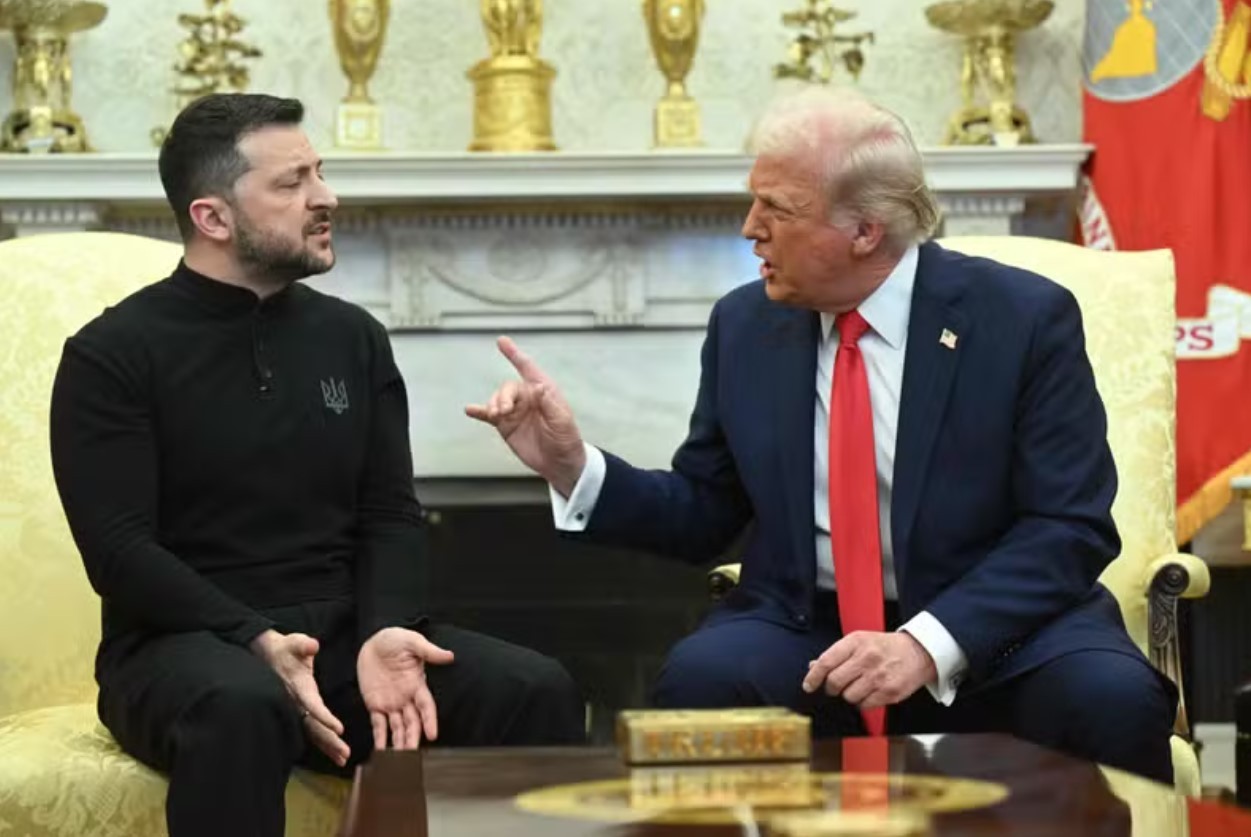What is the Electoral College and Who are The Electors?
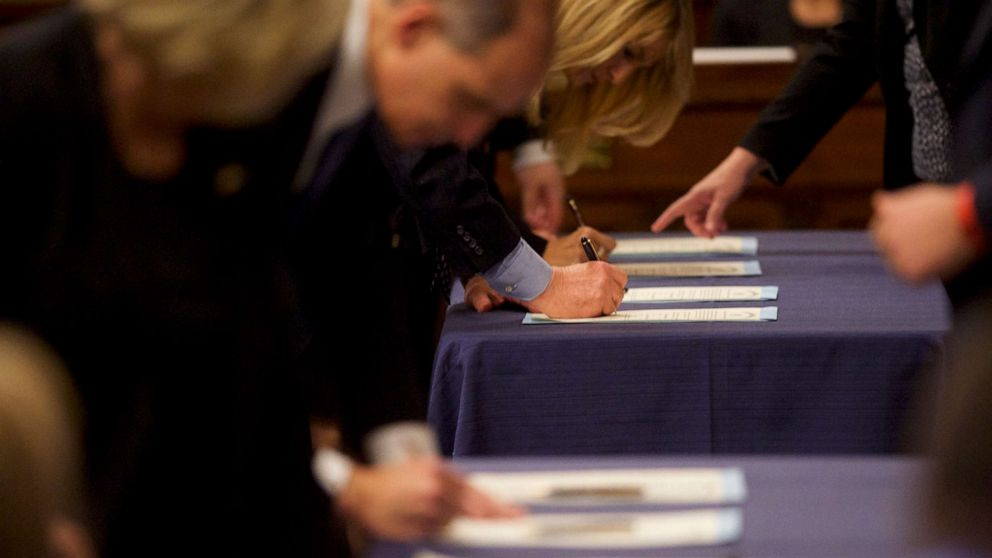 |
| In this Dec. 19, 2016, file photo, electors ratify their cast election ballots in the House of Representatives chamber within the Pennsylvania Capitol Building in Harrisburg, Penn. |
What is Electoral College ?
Electoral College was established early in America's history and continues to play an important role in the country’s political process, as Michigan.gov explained.
Although the name suggests ivy-covered walls and classrooms filled with books, the Electoral College is responsible for formally selecting the next president and vice president of the United States.
On the night of the Presidential Election, most Americans stay tuned to news reports to find out who won. But even after the final votes are tallied and the winner is announced, the choice for president and vice president is not official until the Electoral College casts its votes.
The Electoral College is comprised of 538 people, known as electors, chosen nationwide to meet in their home states and cast one vote per person for president and vice president.
Electors pledge to support the candidate they represent and may not vote otherwise. Voters can be assured that electoral votes automatically go to the presidential candidate winning the popular vote.
Most states distribute their Electoral College votes in the same "winner takes all" fashion. However two states, Maine and Nebraska, apportion their electoral votes by congressional district.
To be elected president, a candidate must receive at least 270 of the 538 electoral votes cast nationwide. If no candidate receives 270 votes, the final decision is made by the U.S. House of Representatives. Only two American presidents have been chosen by the U.S. House of Representatives because they lacked enough Electoral College votes. In 1800, Thomas Jefferson and, in 1824, John Quincy Adams both took office after the election was sent to the House of Representatives.
To understand why the Electoral College, and not the people, ultimately determines who is president requires a brief look into our country's turbulent beginnings. The Electoral College was written into the U.S. Constitution in 1787, a time when the US was new and still struggling in many ways, including politically. Of primary concern was the possibility of a nationwide election breaking down into chaos and confusion.
To counter the politically volatile environment of the late 18th century, the Electoral College was established to balance the state's and people's interests. The idea of mass communication and the dominant two-party political system we take for granted today could never have been anticipated by our country's first leaders as they wrestled with the problems of the early republic.
WHO ARE THE ELECTORS?
Presidential electors typically are elected officials, political hopefuls or longtime party loyalists.
This year, they include South Dakota Gov. Kristi Noem, a Trump elector who could be a 2024 Republican presidential candidate, and Georgia Democrat Stacey Abrams, her party’s 2018 nominee for governor and a key player in Biden’s win in the state.
Among others are 93-year-old Paul “Pete” McCloskey, a Biden elector who is a former Republican congressman who challenged Richard Nixon for the 1972 GOP presidential nomination on a platform opposing the Vietnam War; Floridian Maximo Alvarez, an immigrant from Cuba who worried in his Republican convention speech that anarchy and communism would overrun Biden’s America, and Muhammad Abdurrahman, a Minnesotan who tried to cast his electoral vote for Sen. Bernie Sanders instead of Hillary Clinton in 2016.
When and where are the electors meet?
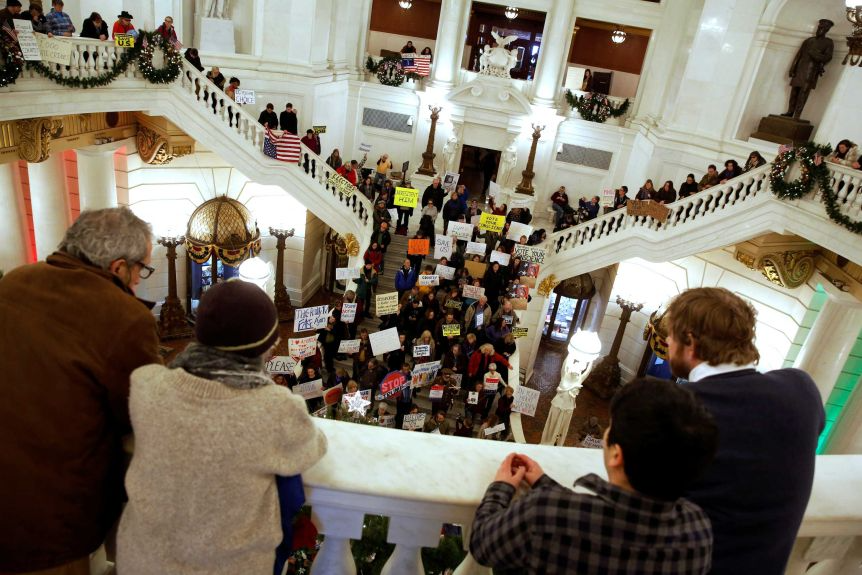 |
| In 2016, protestors gathered at Pennsylvania's State Capitol as electors cast their votes for Donald Trump. (REUTERS/Jonathan Ernst) |
The electors are required by federal law to meet the "Monday after the second Wednesday in December of presidential election years," but they gather in each of their respective states and the nation's capital at places determined by the state legislature, according to ABC News.
Most will convene inside the chambers of their state capitols to cast separate ballots for president and vice president. The time of the meeting is also set by each state, so expect votes to be cast throughout the day on Monday, starting at 10 a.m. ET.
In the middle of a pandemic, a number of states are transforming the quadrennial gathering from pomp and circumstance to a bare-bones formality with much smaller crowds and limited public access, if any.
What to expect at this electors’ meeting?
Each state's slate of electors will cast two votes by a paper ballot in a typically low-drama affair.
Once the votes are tallied, the electors sign six certificates with the results. The separate certificates are submitted to the archivist of the United States, the president of the Senate (the country's vice president), the secretary of state and to the judge of the U.S. district court of the district where the electors met.
The candidates who receive a majority of the vote across the Electoral College -- or 270 votes -- are formally elected to the White House.
“Faithelss” electors
CNN defined that through the Electoral College system, each state gets a certain number of electors based on how many representatives it has in Congress. Those people cast the official votes for President.
Historically, electors have overwhelmingly voted for the candidate who wins the popular vote in their state -- but “faithless electors” can stray.
However, some experts aren't anticipating any spectacles with "faithless" electors this year.
"Because Joe Biden has won with such a large surplus of electors, the temptation for any one or two electors to defect is not present because it couldn't possibly affect the outcome," Pildes said. "[And] if the political parties have done their job in putting forward slates of electors who are going to honor the popular vote in the state for their candidate, which we have every reason to believe they were, then the electors are going to vote in accord with the popular vote in their state." But it is still a possibility.
Some can break their pledge to vote for their party's nominee, as seven successfully did in 2016, but this has happened very few times in the nation's history.
Earlier this year, the Supreme Court ruled on the "faithless electors" case, making it constitutionally permissible to bind electors to vote for the popular vote winner.
Thirty-three states, and Washington, D.C., require electors to keep their pledge. In at least five states, penalties exist for defiant votes, while over a dozen states cancel and replace the rogue elector. More laws are likely to be enacted over the coming years to require electors to follow the popular vote.
Forwarding to January
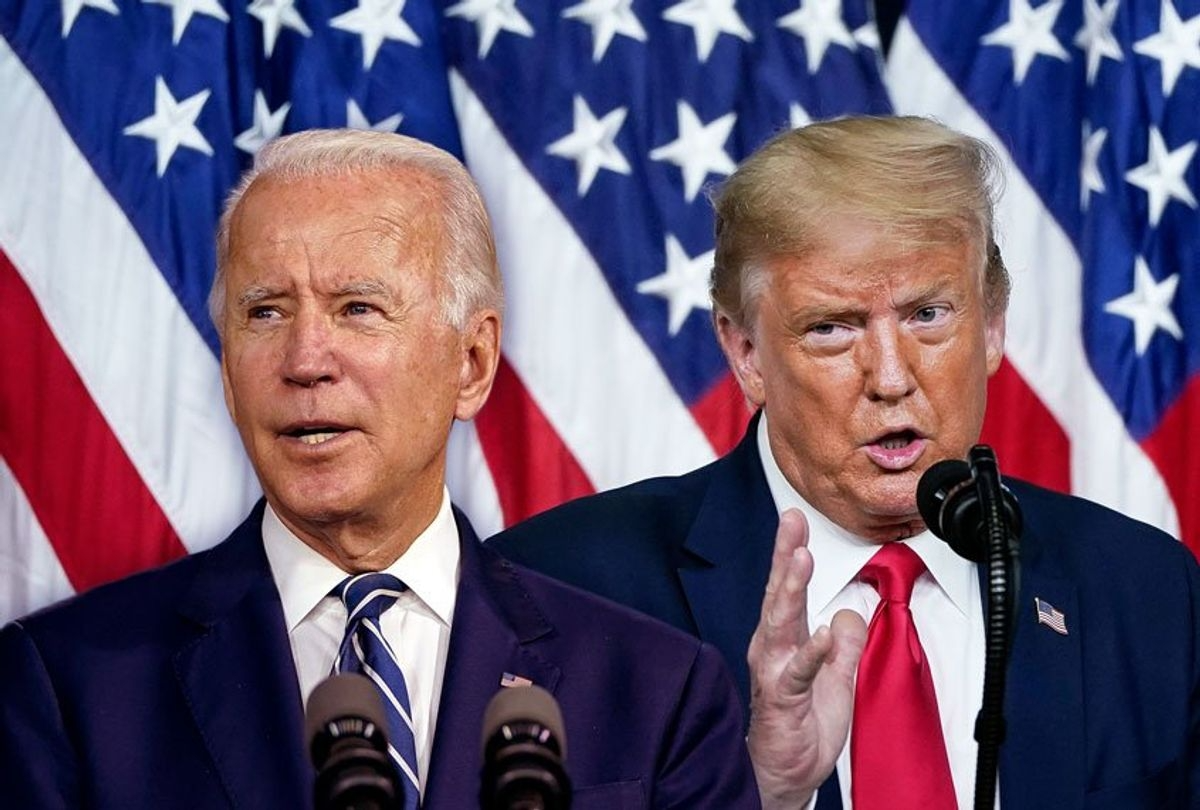 |
| President-elected Joe Biden and President Donald Trump. |
At the first meeting of Congress in Washington DC on January 4, the archivist will hand over every certificate received from state governors.
Then, on January 7, in a joint session of Congress where both the House and Senate meet in-person in the House chamber, the votes are read aloud and tallied.
The candidate who receives 270 votes or more is the winner, although with all state election results now certified the victory is almost certainly Joe Biden's.
If at least one member of each house objects in writing to some electoral votes, the House and Senate meet separately to debate the issue.
The New York Times reports a small group of Mr. Trump's loyal supporters in Congress is plotting a last-minute challenge to the outcome in a number of states.
Both the Senate and the House of Representatives must vote to sustain the objection for it to matter, and the Democratic-led House is unlikely to go along with any objections to votes for Joe Biden.
Without this possible disruption, the votes get counted as intended.
WHAT HAPPENS NEXT?
Once the electoral votes are cast, they are sent to Congress, where both houses will convene on Jan. 6 for a session presided over by Vice President Mike Pence. The envelopes from each state and the District of Columbia will be opened and the votes tallied.
If at least one member of each house objects in writing to some electoral votes, the House and Senate meet separately to debate the issue. Both houses must vote to sustain the objection for it to matter, and the Democratic-led House is unlikely to go along with any objections to votes for Biden. Otherwise, the votes get counted as intended by the states.
And then there’s one more step: inauguration.
Trump's efforts to turn the table
Donald Trump continued his efforts over the weekend, tweeting in all caps that this was the “most corrupt election in US history!”. In an interview with Fox & Friends that aired on Sunday, he insisted that his anti-democratic mission was not over. “We keep going and we’re going to continue to go forward,” he said, before repeating a slew of lies about the election having been rigged.
| Trump and some Republican had sought to have electors removed in four crucial battleground states, but the Supreme Court rejected that attempt on Friday night. After the court victory, Biden spokesman Mike Gwin said, "President-elect Biden's clear and commanding victory will be ratified by the Electoral College on Monday, and he will be sworn in on January 20th." |
Any faltering hopes Trump might still harbor of hanging on to power were shattered on Friday when the US supreme court bluntly dismissed a lawsuit led by Texas to block Biden’s victory in four other states. In a different case, a Wisconsin supreme court judge decried Trump’s lawsuit aiming to nullify the votes of 200,000 Americans, saying it “smacked of racism”.
The Texas-led push to overturn the election result was backed by 126 Republicans in the House of Representatives – almost two-thirds of the party’s conference – as well as Republican state attorneys general from 18 states.
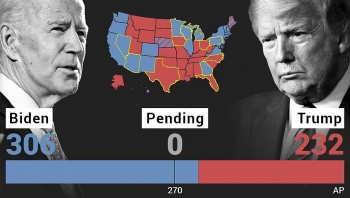 Trump's Fate: No planning to accept the result of the Electoral College Trump's Fate: No planning to accept the result of the Electoral College Trump's Fate: On “Fox & Friends,” Trump said he’s not planning to accept the result of the Electoral College. “No, it's not over,” he said. ... |
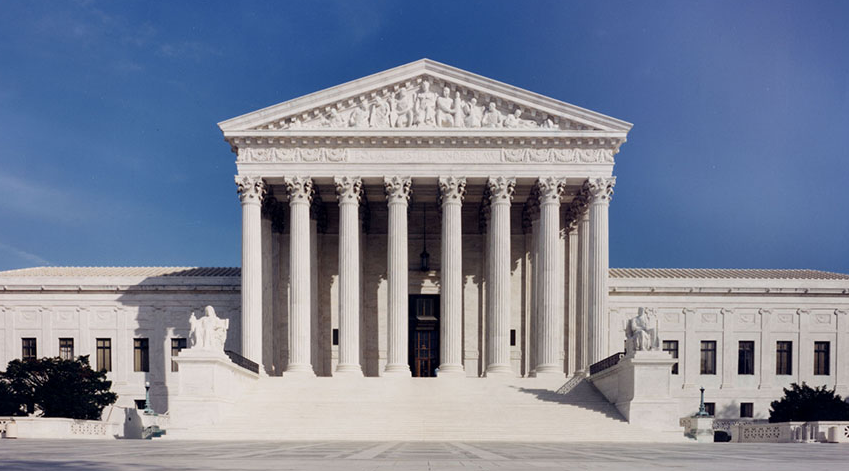 Facts about the U.S Supreme Court Facts about the U.S Supreme Court Facts About The Supreme Court: The Court holds a greatly important role in the political system of a country. That's why in the US, President ... |
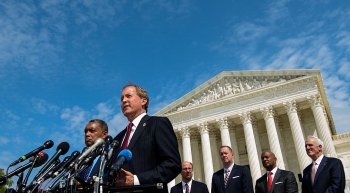 Update News Texas suing 4 states: 17 states have filed in support, Trump moves to intervene Update News Texas suing 4 states: 17 states have filed in support, Trump moves to intervene Update News Texas suing 4 states over election: Georgia, Michigan, Pennsylvania and Wisconsin on Thursday urged the U.S. Supreme Court to reject a lawsuit. |
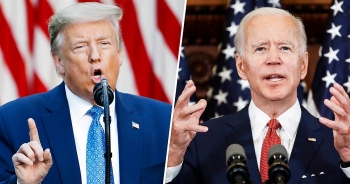 Astrologer's predictions about US Election: Biden or Trump, who will take the office? Astrologer's predictions about US Election: Biden or Trump, who will take the office? Presidential Elections in the United States attracts public attention not only American but also people from all over the world. When the final result hasn't ... |
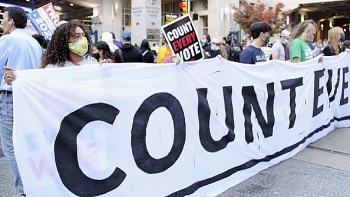 Chair of the Federal Election Commission Trey Trainor believes voter fraud is taking place - Newsmax Chair of the Federal Election Commission Trey Trainor believes voter fraud is taking place - Newsmax During a Friday appearance on Newsmax TV’s “National Report,” Chair of the Federal Election Commission Trey Trainor said locations not granting observers access to watch ... |


